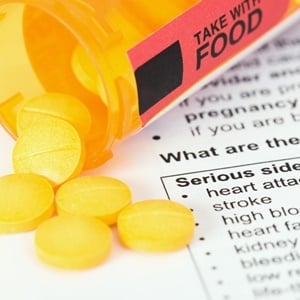
It is estimated that in 2016 a total of 4,27 billion retail prescriptions will be filled throughout the United States, according to the research organisation Statista. On the home front, the South African Depression and Anxiety Group (SADAG) warns us about prescription drug abuse. An estimated 20% of high school students admit to taking prescription drugs without a doctor's prescription.
Especially ADHD medication like Ritalin and Adderall are widely misused and abused. But it’s not only the abuse of the medication that can have dangerous effects – even everyday mistakes can be harmful. We took a look at 7 of the most dangerous medication mistakes.
1. Using medication recreationally
In recent years many studies have shown that anabolic steroids and ADHD medication are used recreationally. A 2014 study done by University of Michigan showed prescription ADHD medications like Adderall, Ritalin and Vyvanse are increasingly being used as “study drugs” by college students. These medications can have a variety of effects on the body, especially if there’s no medical reason to take the medication. Surprisingly, in a 2008 study 81% of 1 800 college students said they do not think using ADHD medication was dangerous “at all” or “only slightly dangerous”.
Read: 7 medications banned in SA
2. Leaving the doctor’s office without enough information
While doctors are experts in their field, many people simply take their word as the gospel truth. Ask them why they're prescribing a certain medication and what the side-effects will be. This is your chance to ask as many questions as possible, and ask for alternatives if you are not comfortable taking a certain medication. Doctors are also human beings and make mistakes. A 2009 study in the British Journal of Clinical Pharmacology found that “prescription errors account for 70% of medication errors that could potentially result in adverse effects”.
3. Taking other people’s medication
This is a very dangerous mistake. It’s very tempting to take your friend’s “left-over” antibiotics when you have influenza, but this can do a lot of harm. Medication is prescribed with a specific patient in mind. Taking someone else’s medication can actually make you sicker, since your body will build up a resistance. A recent US study points out that the “antibiotic resistance crisis has been attributed to the overuse and misuse of these medications”.
4. Not storing medication properly
Most medication should be stored at the right temperature and in the correct environment. Some medications should be stored at room temperature and others, like some children’s cough mixtures, should be kept in the fridge. Research from Harvard University also indicates that the expiration date on medication can have an effect on its efficacy – and can even make the effects stronger.
Read: 7 medication combinations that could be deadly
5. Not taking medication according to doctor’s instructions
A doctor will usually prescribe a dose at which they feel you will derive the most benefit and be exposed to the least amount of risk. Besides several studies indicating that overdosing is a real concern, you are putting too much pressure on organs such as your kidneys and liver if you increase your dosage without consulting your doctor. According to Psych Central, discontinuing certain psychiatric medications can also be dangerous in certain situations.
6. Leaving the pharmacy without checking your medication
Pharmacists are human beings; they make mistakes like any other person. Always check your prescription before you leave the pharmacy. It’s easy for your medication to be given to someone who has a similar name or surname. Fox News recently reported a tragic case of an 8-year-old boy who died after a pharmacist prescribed 1 000 times the dosage he needed of Clonidine, a medication used to treat ADHD. Ultimately it's your responsibility to make sure you are getting the right medication and dosage.
7. Not being aware of possible interactions
While your doctor will look out for possible prescription medication interactions, you should always consult him or her before taking other over-the-counter medication or even natural remedies. For instance, St John's Wort is a botanical dietary supplement, but few people realise the potential danger when you combine this supplement with certain prescription medications. According to the University of Maryland, St. John's Wort either increases or decreases the effectiveness of potentially life-saving medication.
Read more:
Causes and treatment of dry mouth (xerostomia)
How nutrition and medication can help with arthritis
SA has one of the highest prescription rates for ADHD medication




 Publications
Publications
 Partners
Partners











